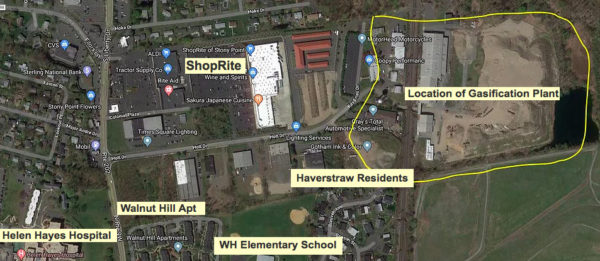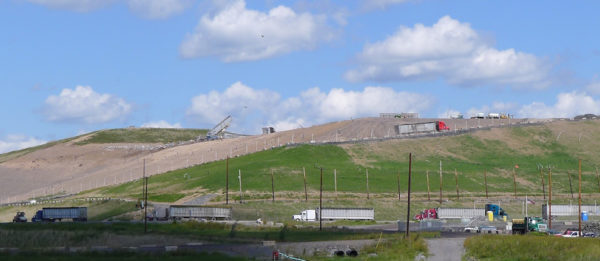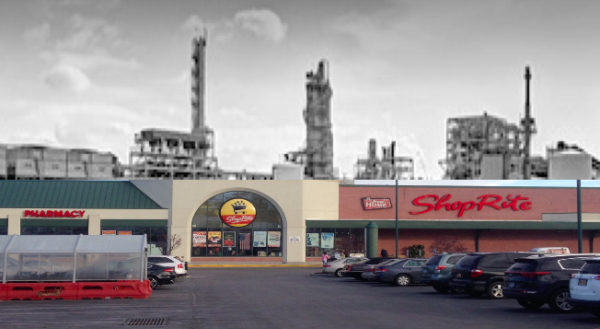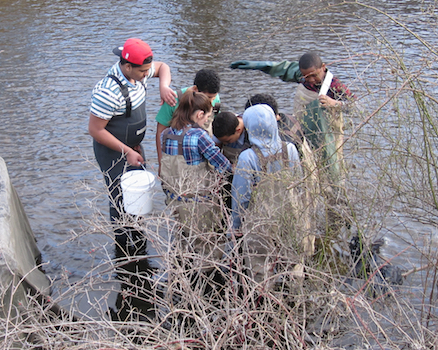 Earth Matters focuses on conservation, sustainability, recycling and healthy living. This weekly series is brought to you by Maria Luisa Boutique, Strawtown Studio and Summer Play Camp at Blue Rock School.
Earth Matters focuses on conservation, sustainability, recycling and healthy living. This weekly series is brought to you by Maria Luisa Boutique, Strawtown Studio and Summer Play Camp at Blue Rock School.If Earth Matters to you, sign up for our mailing list and get the next installment delivered right to your inbox.
by Susan Hellauer
It’s been a rocky few weeks for New Planet Energy’s five-year-old proposition to turn 4,500 tons-per-day of imported garbage, AKA municipal solid waste (MSW), from the New York metro area (not Rockland) into transportation diesel fuel. The prospect of hundreds of heavy-laden trash haulers lumbering up and down two-lane 9W through Orangetown, Clarkstown and Haverstraw has brought resolutions of objection from towns and villages, including a recent one from Nyack. Haverstraw residents and officials are also unhappy that the proposed Stony Point site—the 42-acre former Kay Fries superfund site under remediation—hugs the town border, near their homes, schools, a major hospital, and sensitive waterways like the Minisceongo Creek and Cedar Pond Brook.
And those objections have been getting louder. A grassroots group opposing the project, NO New Planet Energy (NOPE), has been holding meetings, including one attended by about 200 residents and local officials in West Haverstraw on April 1. NOPE is led by Stony Point Democratic Committee chair Gregory Julian, Ph.D., Professor Emeritus, Pace University, where he co-founded the Environmental Studies program. “This resistance to the waste-gasification plant really started with the Rockland Sierra Club, and then the Rockland Citizens Action Network (RCAN), where I was on the Board,” Julian told Earth Matters. He then backed away from those board duties to focus full-time on researching and opposing NPE. “It was a dumb deal, putting that plant right near those populated areas,” he said.

Gregory Julian [standing, center] addresses a gathering of No New Planet Energy [NOPE] after the Stony Point Town Board meeting on April 24. Photo courtesy NOPE
So, is New Planet Energy’s Stony Point Waste-to-Fuel gasification plant idea over? New Planet says yes, that it’s over for the original Stony Point site off 9W; but also no, it’s not over for Rockland County . . . they hope.
What is New Planet Energy?
So, what is New Planet Energy, and what are their credentials in the field of waste diversion and recycling? Well, the resume so far is not promising. While their board, officers and advisers boast individual waste management experience, the company itself does not appear to have any successful projects to its credit. With the help of government economic incentives, they partnered on construction of a landscape waste-to-biofuel project in Vero Beach, Florida, which shut down in 2017, never having produced any biofuel at all, and leaving local taxpayers fuming. New Planet claims that mismanagement by the chemical company that ran the plant is to blame for the failure. Apart from that, NPE’s own website shows no past or future projects other than Stony Point. And the MSW-gasification technology they proposed has not yet been used outside a demo lab.

The site of the now-discarded gasification plant was close to populated areas. Image courtesy NOPE
NPE president and co-founder John Cruikshank agreed to an interview about future plans for Rockland with Earth Matters last week, but, at the appointed time, he politely declined, citing the need for more consultation with his NPE partners. Cruikshank did, however speak to the Journal-News earlier in the week, and said that, although the real estate deal for the Stony Point location had fallen through, New Planet was seeking another suitable location in Rockland County for a scaled-down project. This process—essentially the Phase I of the original plan—would use no water (a serious initial concern), and bring in fewer truckloads of malodorous MSW.
John Cruikshank, President and Co-Founder, New Planet Energy (via Journal News)
A surprise announcement
County Legislator Harriet Cornell convened a hearing of her Environmental Committee last Thursday to shed light on the New Planet project, and air both sides of the argument. All but two of the contributors spoke out against adoption of New Planet’s proposal.
But on May 1, three days before Cornell’s hearing, a letter from Patrick Magee, the proposed site’s owner, to the Town of Stony Point and the New York State Department of Environmental Conservation (DEC) stated that he was withdrawing from the deal. The Journal News first reported that New Planet Energy had consequently withdrawn their plan entirely. But later in the day they published another article, to make it clear that New Planet still intended to pursue a waste-processing project in the county.
Gregory Julian, No New Planet Energy (NOPE)
Keeping an open mind
Unlike NOPE, the 28-year-old local grassroots environmental group, Stony Point Action Committee on the Environment (S.P.A.C.E.), has been “keeping an open mind” about the New Planet project, according to its president George Potanovic, Jr., who blames the loss of the Stony Point location on a real-estate dispute, and not NOPE’s activism. Potanovic himself holds plenty of well-deserved green cred, as co-founder of the 20o8-created Rockland Water Coalition, which managed, by dint of exhaustive research, to beat back a proposal for a desalination plant in the sensitive waters of Haverstraw Bay. While Potanovic acknowledged potential issues with the NPE plant’s location, he also pointed out the bigger waste-disposal picture: An endless garbage-hauler parade, from the metro area and Rockland, to mega-landfills in somebody else’s backyard upstate, or out of state. “Now tell me how that’s sustainable!” he told Earth Matters.

18-wheel trucks dumping 6,000 tons a day of garbage at Seneca Meadows Landfill in Seneca Falls, New York. Ontario County Landfill receives about 3,000 tons a day. Photo: Concerned Citizens of Seneca County
Potanovic was happy that the DEC became lead agency on this project, because of potential environmental concerns. But he also feels that New Planet itself has tried to be transparent with the local residents by holding public scoping sessions. “S.P.A.C.E hasn’t taken a position for or against the project. North Rockland really needs businesses that will bring in tax dollars,” Potanovic said. “But we say: Let the facts be known, and have our public meetings. We’re not trying to push this thing through. This company will make a proposal, and it will go through only if it is right for the town.”

George Potanovic [center] and S.P.A.C.E have been active as environmental stewards in Stony Point since 1990. Image courtesy George Potanovic
But much of the pushback against the gasification project has come from places outside of Stony Point that would feel the impact of increased heavy truck traffic, odors, noise, toxic emissions, decreased property values, and other potential impacts.
A smaller project?
From a conversation with NPE’s Cruikshank last week, George Potanovic made note of the possibility of a scaled-down project, producing a non-volatile “solid recovered fuel” (SRF) as its end product. In the original two-phase, full-scale NPE operation, SRF would be created as the “feedstock” to create the bio-diesel. But SRF—which can be made by more than one process— is itself a marketable commodity, and could help divert a significant chunk of MSW from the landfill.
SRF can be made by chopping and either, (a) drying the MSW into fuel “flakes,” or (b) composting it. Metals and some other recyclables are recovered first. Video: The M&K Group, UK.
One of these European companies, ENTSORGA, is creating America’s first MSW-to-SRF operations, in Martinsburg, WV. Managing the construction is, believe it or not, a company headquartered in Rockland County, BioHiTech Global, in Chestnut Ridge (which is seeking sites in the Hudson Valley as well). The new plant is set to open in September, and is expected to divert enough MSW from West Virginia’s overflowing landfills to reduce greenhouse gas emissions by 28,400 tons per year—and that’s a good thing.
But there’s a catch.
The market for SRF is heavily dependent on certain industries, like coal- or oil-burning power plants, steel mills, and, especially, cement kilns. The Martinsburg plant is being constructed with an SRF buyer, nearby Essroc Cement Company, already under long-term contract. In Europe, where more than 300 such waste processing plants are in operation, observers worry about a capacity glut in the near future.

Composite image created by No New Planet Energy showing their conception of the originally proposed waste-to-gas plant rising behind the Stony Point ShopRite. Image courtesy NOPE
What’s next?
If and when NPE finds a suitable location in the county for a scaled-down project, a new scoping document and another Environmental Impact Statement will have to be filed with the DEC, or whatever other entity becomes the lead agency.
S.P.A.C.E.’s Potanovic remains determined to keep an open mind about New Planet’s reimagined project to reduce landfill waste. “They could take on Rockland’s own waste stream, potentially saving the county million of dollars, and take the pressure off upstate landfills and the people who live near them,” Potanovic said.
Others, like NOPE, don’t seem ready to let down their guard: “This was not only a Stony Point problem; this was a problem for Rockland County,” said NOPE’s Greg Julian, who hopes to see sustainable development for Stony Point, potentially including solar farms at the former New Planet brownfield site. “What we really want to do is emulate Piermont and Nyack and Haverstraw, and develop the Stony Point waterfront and make it open to more people. That’s our work for the future.”
Nancy Low-Hogan, Rockland County Legislator, District-17 (the Nyacks)
Learn more:
- “Waste-to-Fuel Heats Up Rockland” (Nyack News and Views, 7/22/17)
- New Planet Energy website
- New Planet Energy Final Scoping Document for a Draft Environmental Impact Statement (5/13/16)
- NOPE (No New Planet Energy) website and Facebook page
- S.P.A.C.E Facebook page
- “A Message from ‘Away’ Upstate” (Nyack News and Views, 1/21/17)
- “Trash-to-fuel company seeks permit from New Windsor” (Orange County Times Herald-Record, 4/28/18)

Middle- and high-school students from the Haverstraw Community Center counted seven glass eels in the fyke net in
the Minisceongo Creek in Haverstraw. They are led by project coordinator Nicole Laible (blue plaid shirt). Photo: Susan Hellauer
Email Earth Matters
Read Earth Matters every Wednesday in Nyack News And Views, or sign up for the Earth Matters mailing list.
Earth Matters focuses on conservation, sustainability, recycling and healthy living. This weekly series is brought to you by Maria Luisa Boutique, Strawtown Studio and Summer Play Camp at Blue Rock School.











